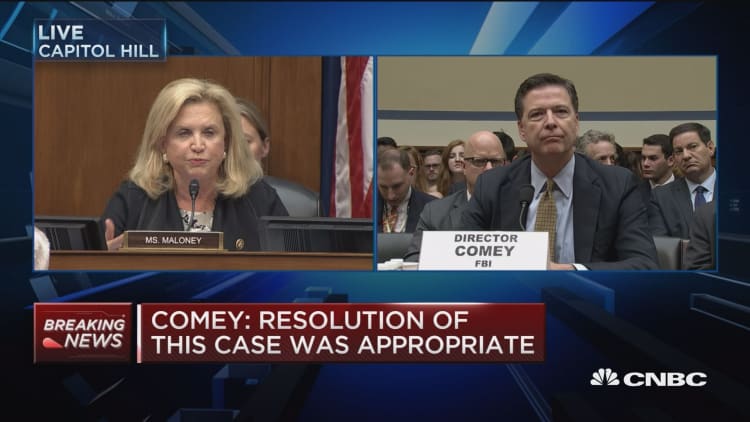



House Oversight and Government Reform Committee Chairman Jason Chaffetz told FBI Director James Comey that he would request the agency investigate whether Hillary Clinton lied under oath to Congress.
"You'll have one in the next few hours," Chaffetz said, after Comey told the chairman that a referral from Congress was needed to investigate Clinton's potential lying under oath.
Clinton's comment in question was one she made in testimony to Rep. Jim Jordan, in which she said "there was nothing marked classified on my emails." Comey told the committee that there was indeed classified information that had passed through Clinton's unauthorized email server that she used while as secretary of state.
The FBI had only investigated specific claims Clinton made to the bureau, Comey said.
In further questioning later on, Rep. Mark Meadows asked whether statements Clinton had made during a presidential debate about not receiving or sending classified information at the time — which appeared to contradict Comey's testimony — were false.
After Comey reiterated his department's findings, Meadows said, "the American people will have to judge with her statement not being true."
Another notable exchange saw Comey suggesting that the former secretary of state's level of sophistication may have been an issue in whether she understood if emails contained classified information. Explaining that three emails on Clinton's server contained "(C)" markings on portions of body text — indicating confidential material — Comey said the FBI considered whether someone may not have understood that demarcation.
"I think it's possible — possible — that she didn't understand what a C meant when she saw it in the body of an email like that," Comey said of Clinton.
Still, Comey later noted all of those emails were improperly marked, as they should have also included a header note warning that they included classified information. In fact, he said it "would be a reasonable inference" for Clinton to conclude that those emails did not include any classified material because of the absence of those headers.
The exchanges came during Comey's testimony before Congress on his agency's recommendation to not prosecute Hillary Clinton.
Comey appeared Thursday morning before the committee, reiterating his contention that the FBI's recommendation was not at all tinged by political considerations.
When he announced Tuesday that he would recommend Clinton not be charged, Comey said the presumptive Democratic presidential nominee and her aides had been "extremely careless" in their handling of classified information. Yet he recommended that they not be prosecuted.
"Although there is evidence of potential violations regarding the handling of classified information, our judgment is that no reasonable prosecutor would bring such a case," he said during a news conference.
Attorney General Loretta Lynch said Wednesday she had accepted the recommendations of Comey and of her prosecutors that no charges be filed. Lynch had previously emphasized she would follow the FBI's lead on the case.
The FBI's announcement created instant backlash from congressional Republicans, who said they felt Comey had laid out a sufficient basis for criminal charges.
"The FBI's recommendation is surprising and confusing. The fact pattern presented by Director Comey makes clear Secretary Clinton violated the law," Chaffetz, a Utah Republican, said in a release. "Individuals who intentionally skirt the law must be held accountable."
Experts have also been divided on the FBI's conclusion, alternately telling CNBC that the move was shocking based on their understanding of the law, and saying Comey was right to recommend against prosecution because investigators did not find intent to cause harm or reap personal gain from the transmission of classified documents.
— The Associated Press and CNBC's Tom DiChristopher contributed to this report.


